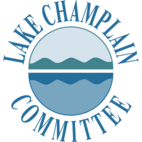Lake Champlain: A Natural History
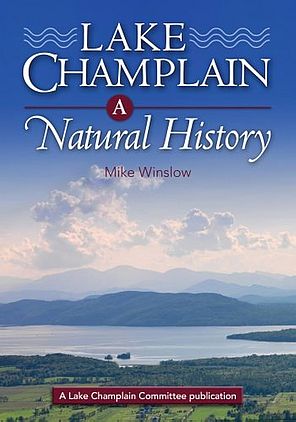
LCC's award-winning book Lake Champlain: A Natural History is co-published by the Lake Champlain Committee (LCC) and Images from the Past (IfP). Short essays in six intriguing chapters cover the lake’s origins and present-day setting, the forces that define the region, the phenomena that add to its mystery, the “living lake” of plants and animals, and the lake’s future. Written in a light, engaging style with black and white photographs and detailed pen and ink illustrations by Libby Davidson, the book will help people discover and understand the lake’s rich and diverse resources. The book builds on a series of monthly columns, “Lake Look”, which LCC has distributed to its members and local and regional newspapers since 2002.
Soaking Up Stormwater: Through Education and Stewardship in the Lake Champlain Basin and Beyond
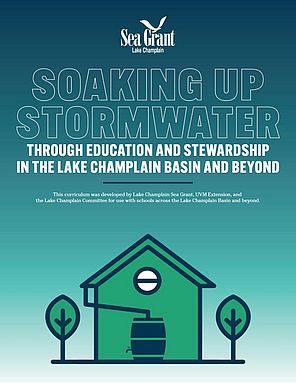
The Lake Champlain Committee collaborated with the Lake Champlain Sea Grant and the University of Vermont Extension to develop the Soaking Up Stormwater Curriculum guide. This curriculum guide is designed to help students and teachers:
- Understand watersheds and the impact that stormwater can play within them;
- Identify possible sources of stormwater in their communities;
- Engage in a stewardship project that helps clean and minimize stormwater runoff to surface waters; and
- Lead others to engage in stormwater stewardship.
The curriculum can be used on its own or in conjunction with the Lake Champlain Sea Grant and UVM Extension Watershed Alliance Stream Monitoring and Stewardship program.
Lake Champlain Paddlers' Trail Guidebook
The annualLake Champlain Paddlers’ Trail Guidebook and Stewardship Manual is an online publication available in June each year. Join or renew your membership for $45 or more to get the current edition.
The publication contains important information to guide your use and stewardship of the Lake Champlain Paddlers’ Trail (LCPT) including:
- over 40 site descriptions and informational chartlets;
- launch site information;
- land use ethics and low-impact camping guidelines;
- tips for planning a safe trip;
- contact lists and emergency phone numbers;
- an equipment check list;
- suggestions for how to become involved in LCC advocacy;
- and informative articles on the Lake’s cultural and natural history and current threats to its health.
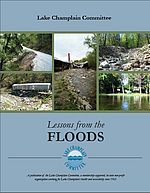
Lessons from the Floods
Recent flood events are forcing Vermont communities to reexamine their relationships with water. In "Lessons from the Floods" LCC sought examples from communities that are particularly vulnerable to flooding, and those that are trying to better prepare for it. As we toured the region and listened to stories of flood damage several themes resurfaced. We have identified eight “lessons” to be considered by communities seeking to increase their resilience to and recovery from future flood events. Seven are focused on river systems and one addresses how to protect lakeshore properties.
Lessons from the Floods - Full Publication
Lesson 1 - Berms create false sense of security
Lesson 2 - Wide floodplains store water and help minimize flood damage
Lesson 3 - Floodplain development puts entire communities at risk
Lesson 4 - Advance preparation pays off
Lesson 5 - When emergency measures create future dangers, go back and fix them
Lesson 6 - Consider whether you really need to rebuild everything
Lesson 7 - Constructed ponds can pose a hazard
Lesson 8 - What makes a lakeshore protection project successful
LCC Cyanobacteria Fliers
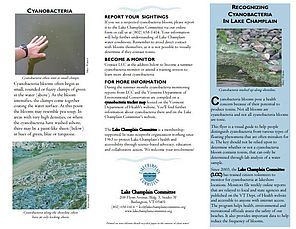
Cyanobacteria blooms have captivated public attention in part because of their potential production of toxins. But not all blooms are cyanobacteria and not all cyanobacteria blooms produce cyanotoxins.
LCC has produced a visual guide to various types of floating phenomena on Lake Champlain. It will help you distinguish cyanobacteria from other common accumulations of plant matter. The key should not be relied upon to determine whether or not a blue-green algae bloom contains toxins.
Links to downloadable PDFs on recognizing cyanobacteria:
How To Manage Stormwater To Promote Healthier Watersheds - An Ahead of the Storm Guide
LCC collaborated with the Lewis Creek Association on this publication to assist landowners in managing stormwater on properties of all sizes. It covers the principles of stormwater management, provides guidance on how to assess sites and troubleshoot problems, and includes a host of tools to delineate a watershed as well as calculate a property’s slope, soil infiltration rate, and stormwater runoff. Click the links below for a downloadable PDF or view it online.
The Stormwater Smart Growth Connection
The impact of stormwater pollution on Lake Champlain is of significant concern. Smart growth principles can help in the management of stormwater. The Lake Champlain Committee, along with the National Wildlife Federation and the Vermont Forum of Sprawl, has produced The Stormwater Smart Growth Connection (pdf, 6.8 MB) to explore the relationship between smart growth principles and stormwater management. The booklet is meant to assist planning efforts in communities throughout the Lake Champlain Basin.
Dishwasher Detergents and Phosphorus
The document Contribution of Phosphorus from Automatic Dishwasher Detergents (ADDs) to Lake Champlain (pdf), completed in 2004, helped build the case for banning phosphorus in automatic dishwasher detergents. It's estimated that ADDs generate about 60 metric tons of phosphorus in the Champlain Basin each year. Even assuming 90 percent removal efficiency at wastewater treatment facilities and 100 percent removal from septic systems there are still two to three metric tons of phosphorus entering Lake Champlain solely due to dishwashers. Since the report was published, several states including Vermont have passed legislation banning the use of phosphorus in ADDs.
Urban Stream Awareness In Lake Champlain Basin
A curriculum guide for high-school teachers, this 55-page publication provides ideas for learning activities and community projects organized into ten lessons. To order a copy, please call the LCC office at (802) 658-1414 or send us an email at lcc@lakechamplaincommittee.org.
